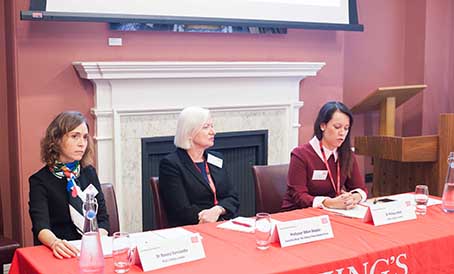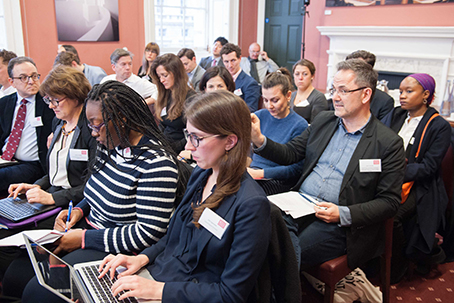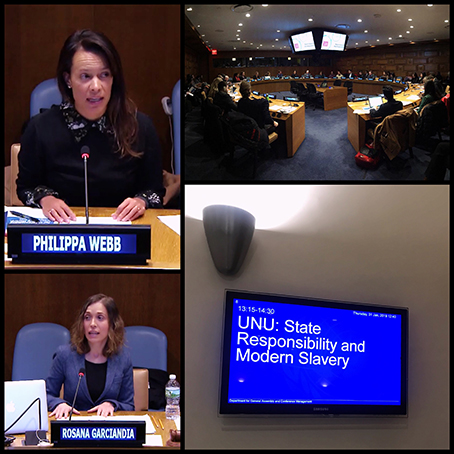State Responsibility for Modern Slavery
Uncovering and Bridging the Gap
- Principal Investigator: Dr Philippa Webb, Reader of Public International Law, King’s
- Research Associate: Dr Rosana Garciandia, Visiting Lecturer of Public International Law, King’s
Read the policy paper in English, French, Spanish, Arabic, and Chinese.
Read focused policy papers on Scenario 1, Scenario 2, Scenario 3, Scenario 4 and Scenario 5.
Modern slavery is a prevailing international challenge. Although slavery has been illegal under international law for over a century, 40.3 million people were in modern slavery on any given day in 2016. King’s, in cooperation with the Centre for Policy Research at United Nations University, has developed a research project to examine states’ responsibility for modern slavery. The project is funded by the British Academy scheme ‘Tackling the UK’s International Challenges 2017’.
This research project aims to address a gap in the current response by examining the responsibility that arises from states for modern slavery. Existing research and strategies have focused on the role of the non-state actors and the positive obligations of states to ‘Prevent, Protect and Punish’ these non-state actors. The responsibility of states has been overlooked or avoided.
Background
The UN 2030 Agenda calls for all actors to work together towards the achievement of Sustainable Development Goals, with special emphasis on the role of states. One of its targets, Target 8.7, calls to “take immediate and effective measures to eradicate forced labour, end modern slavery and human trafficking”.
International law prohibits all forms of modern slavery through instruments ratified by most states in the international community. Slavery and institutions and practices similar to slavery are defined and prohibited by the 1926 Slavery Convention and the 1956 Supplementary Convention; human trafficking is the focus of the Palermo Protocol to Prevent, Suppress and Punish Trafficking in Persons Especially Women and Children, supplementing the UN Convention against Transnational Organised Crime; and forced labour is defined and prohibited by the International Labour Organisation Protocol on Forced Labour.
Despite the prohibition of modern slavery by various instruments of international law, 40.3 million people were in modern slavery on any given day in 2016 according to estimations of the International Labour Organisation. The inclusion of target 8.7 in the 2030 Agenda shows the need for action towards the elimination of all forms of contemporary slavery, where enforcement of the existing instruments raises many challenges.
These challenges are being tackled mainly through the human rights framework and the criminal law framework. The human rights framework focuses on protecting the rights of victims and potential victims of modern slavery. The criminal law framework focuses on prosecuting and convicting those responsible. Under these two frameworks, the state is seen mainly as protector and enforcer. The state has the obligation to create and ensure the functioning of institutions protecting the victims and the potential victims and to guarantee their rights. It also has the obligation to ensure the prosecution and conviction of those actors who are committing the offences. All those constitute the so called “positive obligations” of states to “respect, protect and promote human rights”.
Unfortunately, these are not the only roles that a state can play in modern slavery cases. Some state organs or officials are directly involved in human trafficking, forced labour and slavery. What is worst, in some cases a state can practice slavery as part of its executive policy. There are a wide range of cases in which the state is to some extent involved or complicit in a modern slavery offence. International law provides the legal framework to look at those cases from the perspective of state responsibility.
This project focuses on these situations and analyses them in light of the ILC Articles on Responsibility of States for Internationally Wrongful Acts. Its aim is to identify the main scenarios in which this situation arises and to provide legal policy recommendations that will contribute to achieving target 8.7 while holding states accountable when they are involved in modern slavery cases.
Hypotheses
The project is premised on three hypotheses:
- Some states are involved in modern slavery, typically through organs, state-owned entities and agents.
- States are generally committed to tackling modern slavery by non-state actors and are working to fulfil their positive obligations, but they are avoiding an examination of other states’ potential responsibility.
- There are possibilities for tackling modern slavery through holding states responsible in legal and political fora.
Although data available on these practices is restricted given their illicit nature and the subsequent efforts of states to hide them, the study relies on evidence collected by the UN University in cooperation with the 8.7 Alliance as well as by other international organisations with expertise on the matter.
Project Milestones
Workshops
Summer workshop in New York, 20 July 2018
On 20 July 2018, a first workshop took place in New York with, among other participants, the UN Special Rapporteur on Contemporary Forms of Slavery, Urmila Bhoola, as well as with experts representing civil society organisations and academia. During the workshop, participants analysed the international legal framework on state responsibility and its relevance for modern slavery. The discussion also focused on evidence-based scenarios for which legal policy recommendations have been developed, such as domestic servitude in diplomatic households, the involvement of public officials in human trafficking and the potential role of export credit agencies in funding slavery-tainted enterprises.
Autumn workshop in London, 16 November 2018
On 16 November 2018, a second workshop gathered leading experts from around the world in London, to ‘stress test’ the ground-breaking proposals developed as a result of the first phase of the project.

The proposals include the use of human rights mechanisms, commercial sanctions and the invocation of state responsibility. The diversity of experts in the room – civil society leaders, officials of international organisations, diplomats, parliamentary advisers, journalists, practitioners at law firms and at the Bar, and academics – enriched and nuanced the existing proposals and contributed to the advancement of this important project. More information on the event is available here.

Launch event at the UN
On 31 January 2019, the legal policy recommendations developed within the project were launched at the UN Headquarters in New York. The recommendations were presented to a wide audience including state representatives, international organisations and civil society organisations. The agenda featured presentations on the project, the factual scenarios and the recommendations by Dr Philippa Webb and Dr Rosana Garciandia, as well as commentaries by Professor Brad Blitz, Director of the British Academy Programme on Tackling Slavery, Human Trafficking and Child Labour in Modern Business and Professor of International Politics at Middlesex University, and by Professor Kristen E. Boon, Miriam T. Rooney Professor of Law at Seton Hall. The event was chaired by Dr James Cockayne, Director of the Centre for Policy Research of the United Nations University. The video of the event is available on the UN TV website. A short version of the video is also available here.

Other events
Publications
- Policy paper in English, French, Spanish, Arabic, and Chinese.
- EJIL: Talk! blog of the European Journal of International Law.
- 'Are States Accountable for modern slavery?' in the Groningen Journal of International Law.
Links to relevant sources